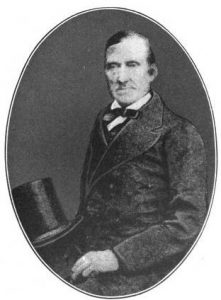Charles Lane was a political activist, abolitionist, Transcendentalist, and contributor to The Dial. In 1842, Lane met Bronson Alcott when he had ventured to England in search of people for his communal living experiment. Lane traveled back to Massachusetts with Alcott and became close friends with the other Transcendentalists in the area, namely Thoreau and Emerson. As a Transcendentalist, Lane was known for both his participation in Fruitlands and his political engagement.

Fruitlands
In May of 1843, Charles Lane and Bronson Alcott purchased a 90 acre area of land in Harvard, Massachusetts and named it Fruitlands. They, along with 12 others, moved onto the farm on June 1st with the intention of creating a new ethical and sustainable way of living.
Fruitlands was designed so that people would not buy property. Land was not something that could be purchased or sold in the eyes of the Fruitlands residents. One of their ultimate goals of the community members was to separate themselves from a capitalistic society that pushed economic industry. As such, people did not acknowledge private property or use paid labor. The residents were to grow all their own food and were not allowed to trade with others outside the property. To be ethical, they refrained from meat in any capacity and adopted a vegan diet of only low processed fruits and vegetables. Amenities like tea and coffee were also strictly prohibited and residents were asked only to wear linen as a way of avoiding cotton products made with slave-labor.
This lifestyle did not prove to be particularly viable as Fruitlands did not survive through the winter. Fruitland’s demise was primarily caused by a major food shortage as the residents had a very limited diet and could not rely on many preserved products. Lane casted blame onto Alcott for the failed experiment, saying that Alcott’s optimism was too misleading.
Political Engagement
Lane was also known as an activist. When Bronson Alcott was arrested in 1843, both Lane and Thoreau made a plan to agitate the state further, protesting Alcott’s arrest. However, when the two arrived at the Concord Lyceum that night, they found that Alcott had already been released. While Thoreau was disappointed to see that someone had paid Alcott’s taxes and felt defeated, Lane still wanted to make a statement. After the lecture of the evening, Lane spoke with outrage about what happened to Alcott and proposed that tax money should not be used towards endeavors that perpetuate slavery. While not many were convinced by Lane’s argument, Thoreau certainly was. Thoreau supported Lane when he too stopped paying his taxes that December and was sent to the Middlesex County Jail. Furthermore, Thoreau took inspiration from Alcott and Lane’s peaceful protest, and the notion of peaceful resistance is the foundation of Thoreau’s essay “Civil Disobedience.”
Charles Lane’s Writing:

